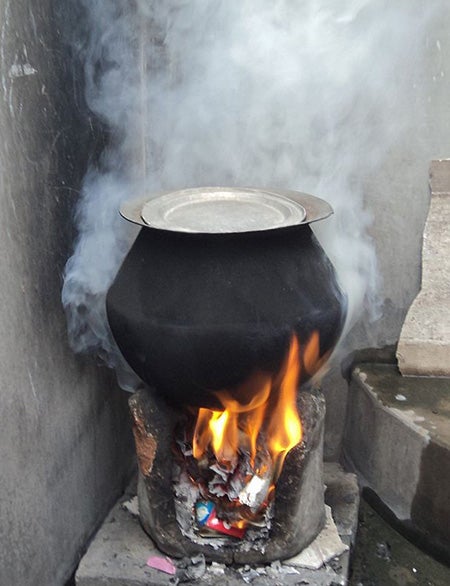Researchers seek to reduce deadly air pollution from open-fire cooking
New grant will help measure, find solutions to deadly air pollution
Jun 24, 2014 - by Staff
Jun 24, 2014 - by Staff
BOULDER - A $1.5 million grant from the Environmental Protection Agency will help researchers measure pollution from residential open-fire cooking and better understand a problem that kills millions of women and children each year in the developing world.

A rural stove using biomass cakes, fuelwood and trash as cooking fuel, Tamil Nadu, India. (Photo by தகவலுழவன், courtesy Wikimedia Commons.)
According to the EPA, more than 3 billion people worldwide rely on the burning of wood, plant matter, coal and waste for cooking or heating. Exposure to cooking emissions, articularly indoor exposure, ranks as one of the five worst overall health risk factors in poor developing countries, with the World Health Organization estimating 4.3 million premature deaths per year due to exposure to smoke from traditional cookstoves.
"You can see the air quality impacts from cooking over open fires, as there is often a haze hanging over remote villages during certain times of day," said NCAR scientist Christine Wiedinmyer, a principal investigator on the project. “This not only affects health, but can cause poor air quality regionally and impact the climate."
"We’re hoping to figure out how to reduce women and children’s exposure to air pollutants in sub-Saharan Africa through technology and getting people to think about changes to their behavior," said Mike Hannigan, associate professor of mechanical and environmental engineering at the University of Colorado Boulder and principal investigator on the project.
Researchers from NCAR, CU, and the Navrongo Health Research Center in Ghana will study 250 households in northern Ghana to measure the levels of pollutants to which adults and children are exposed from cooking as well as from burning trash and car pollution. They will also look at the potential health benefits of modern, low-polluting cookstoves.
For more, see the University of Colorado Boulder announcement.